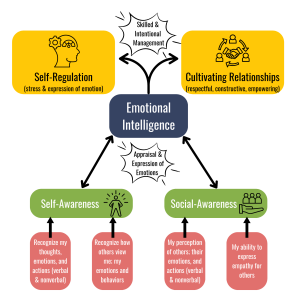Knowledge Building:
Review this graphic to gain a high-level perspective of Emotional Intelligence (EI).

Ever notice how emotions can totally change the way your day goes at work? That’s where emotional intelligence (EI) comes in—it’s your ability to understand and manage your own emotions, while also being aware of how others feel. Studies show that people with high emotional intelligence are 90% more likely to be top performers. Plus, teams with emotionally intelligent contributors can boost their performance by up to 20%. Let’s dive into three key strategies to help you build and apply emotional intelligence in your own work life.
Strategy 1: Cultivate Self-Awareness
Start by paying attention to your emotions in the moment. Recognize what triggers feelings like stress or frustration and how they affect your reactions. When you understand your emotional triggers, you can better manage your responses, especially in challenging situations. This self-awareness helps you stay calm and constructive, no matter what’s happening.
Strategy 2: Foster Empathy and Understanding
Emotional intelligence isn’t just about your own feelings—it’s about connecting with others too. Take time to consider what your coworkers might be going through emotionally. By practicing empathy, you can support your team more effectively, resolve conflicts faster, and build stronger relationships. Research shows that empathy improves team collaboration and overall engagement.
Strategy 3: Encourage Open Communication
Emotions can sometimes be tricky to talk about, but being open and respectful about how you feel can prevent misunderstandings. Encourage honest conversations, where everyone can share their emotions and ideas without judgment. This kind of communication helps clear the air and keeps things from escalating into bigger issues.
Emotional intelligence goes beyond just keeping emotions in check—it’s about building empathy, trust, and strong communication. By developing self-awareness, understanding the emotions of those around you, and promoting open conversations, you’ll create a more supportive and effective work environment. Start using EI intentionally, and watch how it transforms your work relationships and performance.